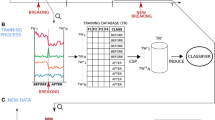Abstract
In this paper, we present a methodology for drift detection and characterization. Our methodology is based on extracting indicators that reflect the health state of a system. It is situated in an architecture of fault diagnosis/prognosis of dynamical system that we present in this paper. A dynamical clustering algorithm is used as a major tool. The feature vectors are clustered and then the parameters of these clusters are updated as each feature vector arrives. The cluster parameters serve to compute indicators for drift detection and characterization. Then, a prognosis block uses these drift indicators to estimate the remaining useful life. The architecture is tested on a case study of a tank system with different scenarios of single and multiple faults, and with different dynamics of drift.
Access this chapter
Tax calculation will be finalised at checkout
Purchases are for personal use only
Preview
Unable to display preview. Download preview PDF.
Similar content being viewed by others
References
Basseville, M., Nikiforov, I.: Detection of Abrupt Changes: Theory and Application. Prentice Hall, Inc. (1993)
Boubacar, H.A., Lecoueuche, S., Maouche, S.: Audyc neural network using a new gaussian densities merge mechanism. In: 7th Conference on Adaptive and Neural Computing Algorithms, pp. 155–158 (2004)
Brotherton, T., Jahns, G., Jacobs, J., Wroblewski, D.: Prognosis of faults in gas turbine engines. In: IEEE Aerospace Conference (2000)
Byington, C., Roemer, M., Kacprzynski, G., Galie, T.: Prognostic enhancements to diagnostic systems for improved condition-based maintenance. In: IEEE Aerospace Conference (2002)
Chandola, V., Banerjee, A., Kumar, V.: Anomaly detection: A survey. Technical report, ACM Computing Surveys (2009)
Isermann, R.: Model-based fault detection and diagnosis - status and applications. Annual Reviews in Control 29, 71–85 (2005)
Jardine, A.K.S., Lin, D., Banjevic, D.: A review on machinery diagnostics and prognostics implementing condition-based maintenance. Mechanical Systems and Signal Processing 20, 1483–1510 (2006)
Kuncheva, L.: Using control charts for detecting concept change in streaming data. Technical report, Technical Report BCS-TR-001 (2009)
Kuncheva, L.I.: Classifier Ensembles for Changing Environments. In: Roli, F., Kittler, J., Windeatt, T. (eds.) MCS 2004. LNCS, vol. 3077, pp. 1–15. Springer, Heidelberg (2004)
Lecoueuche, S., Lurette, C.: Auto-Adaptive and Dynamical Clustering Neural Network. In: Kaynak, O., Alpaydın, E., Oja, E., Xu, L. (eds.) ICANN 2003 and ICONIP 2003. LNCS, vol. 2714, pp. 350–358. Springer, Heidelberg (2003)
Li, G., Qin, J., Ji, Y., Zhou, D.-H.: Reconstruction based fault prognosis for continuous processes. Control Engineering Practice 18, 1211–1219 (2010)
Iverson, D.L.: Inductive system health monitoring. In: Proceedings of The 2004 International Conference on Artificial Intelligence (IC-AI 2004). CSREA Press, Las Vegas (2004)
Markou, M., Singh, S.: Novelty detection: a review–part i: statistical approaches. Signal Processing 83, 2481–2497 (2003)
Meeker, W.Q., Escobar, L.A.: Statistical Methods for Reliability Data. Wiley series in probability and statistics, applied probability and statistics section. Jhon Wiley and Sons, New York (1998)
Minku, L.L., Yao, X.: Ddd: A new ensemble approach for dealing with concept drift. IEEE Transactions on Knowledge and Data Engineering (2011)
Muller, A., Marquez, A.C., Iunga, B.: On the concept of e-maintenance: Review and current research. Reliability Engineering and System Safety 93, 1165–1187 (2008)
MvBain, J., Timusk, M.: Fault detection in variable speed machinery: Statistical parametrization. Journal of Sound and Vibration 327, 623–646 (2009)
Noortwijk, V.: A survey of the application of gamma process in maintenance. Reliability Engineering & System Safety 94, 2–21 (2009)
Oppenheimer, C., Loparo, K.: Physically based diagnosis and prognosis of cracked rotor shafts. In: Preceeding of SPIE (2002)
Peysson, F., Boubezoul, A., Oulasdine, M., Outbib, R.: A data driven prognostic methodology without a priori knowledge. In: Proceedings of the 7th IFAC Symposium on Fault Detection, Supervision and Safety of Technical Processes (2009)
Peysson, F., Oulasdine, M., Outbib, R., Leger, J.-B., Myx, O., Allemand, C.: Damage trajectory analysis based prognostic. In: International Conference on Prognostics and Health Management, PHM 2008 (2008)
Sayed-Mouchaweh, M.: Semi-supervised classification method for dynamic applications. Fuzzy Sets and Systems 161, 544–563 (2012)
Si, X.-S., Wang, W., Hu, C.-H., Zhou, D.-H.: Remaining useful life estimation - a review on the statistical data driven approaches. European Journal of Operational Research 213, 1–14 (2011)
Traore, M., Duviella, E., Lecoeuche, S.: Comparison of two prognosis methods based on neuro fuzzy inference system and clustering neural network. In: SAFE PROCESS (2009)
Tsymbal, A.: The problem of concept drift: definitions and related work. Trinity College, Dublin, Ireland, TCD-CS-2004-15 (2004)
Vachtsevanos, G., Lewis, F., Roemer, M., Hess, A., Wu, B.: Intelligent Fault Diagnosis and Prognosis for Engineering Systems. Jhon Wiley and Sons, Inc. (2006)
Venkatasubramanian, V., Rengaswamy, R., Yin, K., Kavuri, S.: A review of process fault detection and diagnosis part iii: Process history based methods. Computers and Chemical Engineering 27, 327–346 (2003)
Yan, J., Lee, J., Koc, M.: Predictive algorithm for machine degradation using logistic regression. In: MIM 2002 (2002)
Indre zliobate. Learning under concept drift: an overview. Technical report, Vilnius University (2009)
Author information
Authors and Affiliations
Editor information
Editors and Affiliations
Rights and permissions
Copyright information
© 2012 Springer-Verlag Berlin Heidelberg
About this paper
Cite this paper
Chammas, A., Sayed-Mouchaweh, M., Duviella, E., Lecoeuche, S. (2012). Drift Detection and Characterization for Fault Diagnosis and Prognosis of Dynamical Systems. In: Hüllermeier, E., Link, S., Fober, T., Seeger, B. (eds) Scalable Uncertainty Management. SUM 2012. Lecture Notes in Computer Science(), vol 7520. Springer, Berlin, Heidelberg. https://doi.org/10.1007/978-3-642-33362-0_9
Download citation
DOI: https://doi.org/10.1007/978-3-642-33362-0_9
Publisher Name: Springer, Berlin, Heidelberg
Print ISBN: 978-3-642-33361-3
Online ISBN: 978-3-642-33362-0
eBook Packages: Computer ScienceComputer Science (R0)




